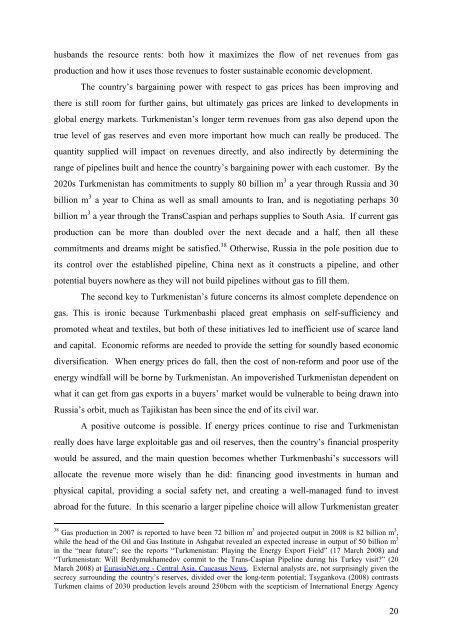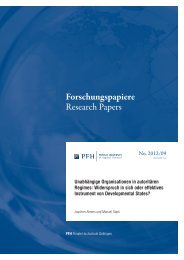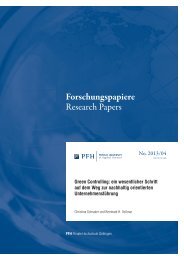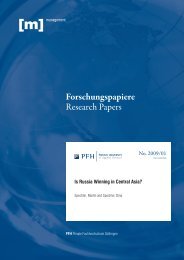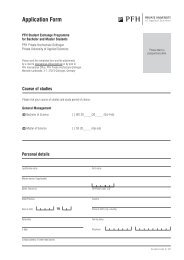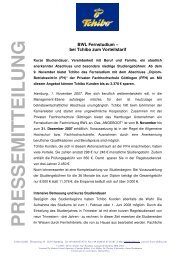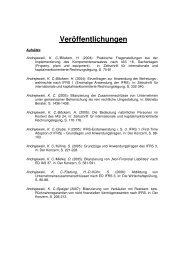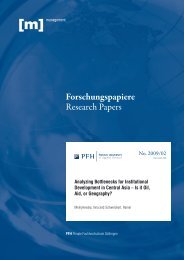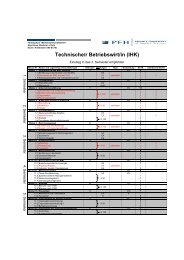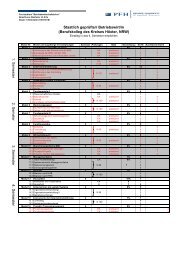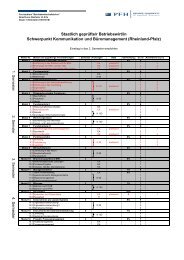Forschungspapiere Research Papers - PFH Private Hochschule ...
Forschungspapiere Research Papers - PFH Private Hochschule ...
Forschungspapiere Research Papers - PFH Private Hochschule ...
You also want an ePaper? Increase the reach of your titles
YUMPU automatically turns print PDFs into web optimized ePapers that Google loves.
husbands the resource rents: both how it maximizes the flow of net revenues from gas<br />
production and how it uses those revenues to foster sustainable economic development.<br />
The country’s bargaining power with respect to gas prices has been improving and<br />
there is still room for further gains, but ultimately gas prices are linked to developments in<br />
global energy markets. Turkmenistan’s longer term revenues from gas also depend upon the<br />
true level of gas reserves and even more important how much can really be produced. The<br />
quantity supplied will impact on revenues directly, and also indirectly by determining the<br />
range of pipelines built and hence the country’s bargaining power with each customer. By the<br />
2020s Turkmenistan has commitments to supply 80 billion m 3 a year through Russia and 30<br />
billion m 3 a year to China as well as small amounts to Iran, and is negotiating perhaps 30<br />
billion m 3 a year through the TransCaspian and perhaps supplies to South Asia. If current gas<br />
production can be more than doubled over the next decade and a half, then all these<br />
commitments and dreams might be satisfied. 38 Otherwise, Russia in the pole position due to<br />
its control over the established pipeline, China next as it constructs a pipeline, and other<br />
potential buyers nowhere as they will not build pipelines without gas to fill them.<br />
The second key to Turkmenistan’s future concerns its almost complete dependence on<br />
gas. This is ironic because Turkmenbashi placed great emphasis on self-sufficiency and<br />
promoted wheat and textiles, but both of these initiatives led to inefficient use of scarce land<br />
and capital. Economic reforms are needed to provide the setting for soundly based economic<br />
diversification. When energy prices do fall, then the cost of non-reform and poor use of the<br />
energy windfall will be borne by Turkmenistan. An impoverished Turkmenistan dependent on<br />
what it can get from gas exports in a buyers’ market would be vulnerable to being drawn into<br />
Russia’s orbit, much as Tajikistan has been since the end of its civil war.<br />
A positive outcome is possible. If energy prices continue to rise and Turkmenistan<br />
really does have large exploitable gas and oil reserves, then the country’s financial prosperity<br />
would be assured, and the main question becomes whether Turkmenbashi’s successors will<br />
allocate the revenue more wisely than he did: financing good investments in human and<br />
physical capital, providing a social safety net, and creating a well-managed fund to invest<br />
abroad for the future. In this scenario a larger pipeline choice will allow Turkmenistan greater<br />
38 Gas production in 2007 is reported to have been 72 billion m 3 and projected output in 2008 is 82 billion m 3 ,<br />
while the head of the Oil and Gas Institute in Ashgabat revealed an expected increase in output of 50 billion m 3<br />
in the “near future”; see the reports “Turkmenistan: Playing the Energy Export Field” (17 March 2008) and<br />
“Turkmenistan: Will Berdymukhamedov commit to the Trans-Caspian Pipeline during his Turkey visit?” (20<br />
March 2008) at EurasiaNet.org - Central Asia, Caucasus News. External analysts are, not surprisingly given the<br />
secrecy surrounding the country’s reserves, divided over the long-term potential; Tsygankova (2008) contrasts<br />
Turkmen claims of 2030 production levels around 250bcm with the scepticism of International Energy Agency<br />
20


